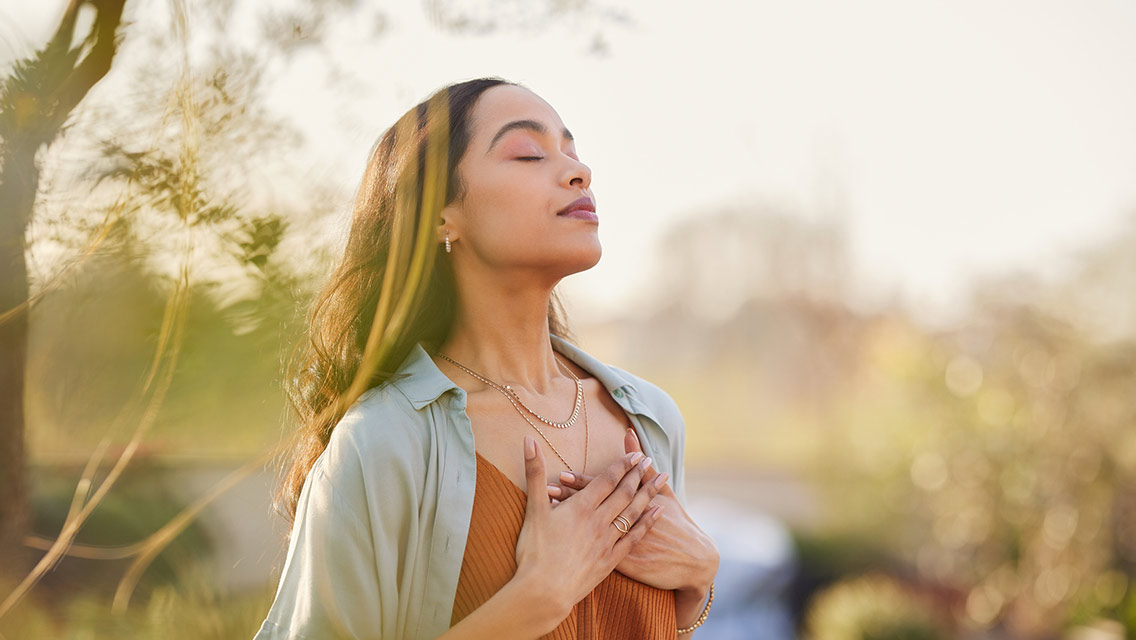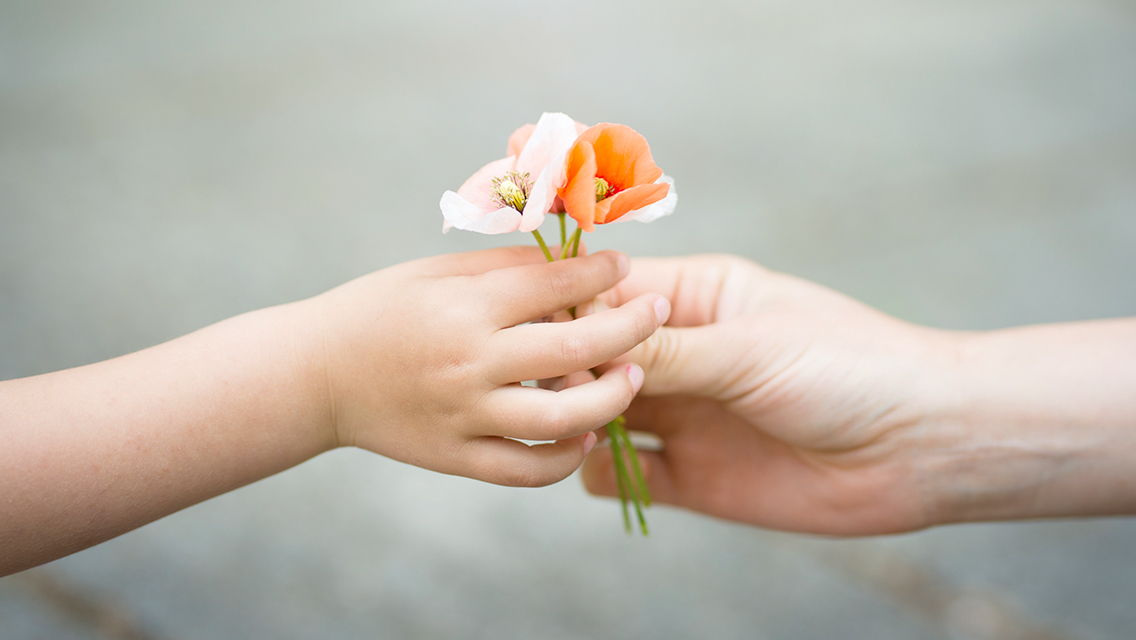Ten years ago, Diana Rico began writing lists of the things she’s grateful for. An arts and entertainment journalist, independent filmmaker, and author who divides her time between Taos, N.M., Los Angeles and Denver, Rico says she needs to feel positive to do her creative work. And she’s found that she can reliably lift her mood just by writing down – first thing in the morning or last thing at night – 10 things for which she’s grateful.
“It changes my brain chemistry,” she says. “I feel much more empowered when I’m feeling positive.”
Today, Rico recommends the gratitude list to students in her writer’s-block workshops. She believes it’s easier for people to break through their fears and avoidance when they take note of and appreciate the beauty that surrounds them – a simple meal, flowers on the table, a child or a friendship. “I’ve never seen anybody not get something positive out of doing the gratitude list.”
As for herself, Rico has turned gratefulness into a way of life. “I actively try to practice gratitude all the time,” she says. “Everything is a blessing in some form. I believe if you put yourself into a state of gratitude, it’s easier to manifest what you want.”
Rico is one of a growing number of people – from artists to psychologists to health researchers – who are recognizing the power of gratitude. Long held by many religions and philosophers as a central element of human virtue, gratitude is now being heralded by scientists as a verifiable component of a healthy life.
The Benefits of Gratitude
In their long-term scientific study on the nature of gratitude, psychologists Robert Emmons, PhD, and Michael McCullough, PhD, found that grateful people report “higher levels of positive emotions, life satisfaction, vitality, optimism, and lower levels of depression and stress.” Grateful people also tend to place less importance on material goods and are less envious of others.
Emmons and McCullough found that people who keep gratitude journals (as opposed to those who use their journals to describe hassles or neutral life events) exercise more regularly, report fewer physical symptoms, feel better about their lives as a whole and are more optimistic about the upcoming week. Those who write gratitude lists are more likely to make significant progress toward achieving important personal goals.
Grateful people also tend to have more optimism in general, which has been proven in many studies to boost the immune system and improve outcomes for people with compromised health.
Martin Seligman, PhD, a psychologist who in 1998 launched the field of positive psychology, considers gratitude an important character strength. (Learn more at www.authentichappiness.org.) He and other positive psychology researchers see such strengths – which also include qualities like integrity, perseverance, kindness and forgiveness – as virtues that enable people to thrive.
If dwelling on negative events from your past keeps you from being happy, Seligman says, gratitude and forgiveness can help. “Insufficient appreciation and savoring of the good events in your past and overemphasis of the bad ones are the two culprits that undermine serenity, contentment and satisfaction,” he writes in Authentic Happiness: Using the New Positive Psychology to Realize Your Potential for Lasting Fulfillment. “Gratitude amplifies the savoring and appreciation of the good events gone by, and rewriting history by forgiveness loosens the power of the bad events to embitter (and actually can transform bad memories into good ones).”
According to Frederic and Mary Ann Brussat, authors of Spirituality Rx: Prescriptions for Living a Meaningful Life and directors of Spirituality & Practice (www.spiritualityandpractice.com), gratitude enhances satisfaction and counters the negative effects of greed, jealousy, taking things for granted and feeling entitled. “The spiritual practice of gratitude has been called a state of mind and a way of life,” they write. “But we prefer to think of it as a grammar – an underlying structure that helps us construct and make sense out of our lives.”
Share the Love
Gratitude itself, it turns out, is something to be thankful for. The more you practice it, the better you feel.
Those around you feel better, too. Emmons and McCullough note that gratitude encourages a positive cycle of reciprocal kindness. In other words, one expression of gratitude encourages another. They found that people who are grateful are more likely to feel loved.
Gratitude also appears to encourage generosity, meaning that when we feel grateful for what we have, we may be more likely to share freely with others – and also to inspire and receive kindnesses from others. According to M. J. Ryan, author of Attitudes of Gratitude: How to Give and Receive Joy Every Day of Your Life, the interplay of gratitude and generosity starts an ever-expanding circle of open-heartedness.
“It doesn’t matter where you enter the circle – in gratitude or with generosity,” she writes in The Giving Heart: Unlocking the Transformative Power of Generosity in Your Life. “The more you experience one, the more the other enhances your life as well. You feel truly grateful, and from that fullness you offer something to someone else – an encouraging word or a helping hand. In return, you receive love, the feeling of connection, and a sense of satisfaction and fulfillment that continues to fuel your gratitude for the gifts of life you have received.”
So go ahead, be grateful. You’ll feel healthier, and more positive – and so will those around you.
An Attitude of Gratitude
To cultivate optimism, joy and serenity, try practicing the art of grateful living.
- Focus on your blessings. Close your eyes and call to mind something to be grateful for, paying particular attention to your feelings, suggests Charles Shelton, associate professor of psychology at Regis University in Denver, in his book Achieving Moral Health: An Exercise Plan for Your Conscience. After a minute, open your eyes and ask yourself what you are feeling.
- Keep a written record. Psychologists Robert Emmons, PhD, and Michael McCullough, PhD, found that people who write about the things they’re grateful for feel healthier and more optimistic. Writer and teacher Diana Rico suggests writing a daily list of 10 things you are grateful for. Begin each sentence with the words “I am grateful for….” You’ll notice how uplifted you feel and how positive your outlook can become.
- Write a gratitude letter. “Select one important person from your past who has made a major positive difference in your life and to whom you have never fully expressed your thanks,” suggests Martin Seligman, PhD, in Authentic Happiness. Take your time – a few days or even a few weeks – to write a one-page testimonial about why this person is so important to you. Then get together with the person you appreciate and read the testimonial out loud.
- Designate a daily cue. Pick a daily activity – maybe picking up a fork to eat a meal or walking in the door of your home – that you can use as a cue to count your blessings, suggest Frederic and Mary Ann Brussat in Spirituality Rx. With practice, you will eventually experience an automatic flood of gratitude every time you engage in that activity.
- Express your appreciation.“To learn the grammar of gratitude,” write the Brussats, “practice saying ‘thank you’ for happy and challenging experiences, for people, animals, things, art, memories, dreams….Utter blessings and express your appreciation to everything and everyone you encounter.”
For more exercises to develop a sense of gratitude, visit www.gratefulness.org or www.spiritualityandpractice.com.
This article has been updated and originally appeared as “Get Grateful” in the December 2006 issue of Experience Life.





This Post Has One Comment
Wonderful article and I’m grateful to have read it
Thank you 😊
Sue